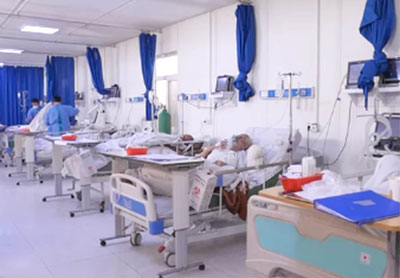Doctors expressed concern over the sharp increase of patients infected by COVID-19, saying that the number of reported patients showing the symptoms of the new COVID-19 variant has risen by 70 percent within the past week compared to the week before.
They called on citizens to take the virus seriously.
The Afghan Health Ministry lacks access to testing supplies for the new COVID-19 variant “Omicron” and therefore it uses the kits designed for the previous variants of Covid-19.
According to the Ministry of Public Health (MoPH), at least 429 patients showing symptoms of the new COVID-19 variant were recorded in the past 24 hours.
Many of these patients are from Kabul, Kandahar and Nangarhar. “(COVID-19) has had a significant increase. 429 patients were tested positive from 2,800 samples yesterday all over Afghanistan,” said Javid Hajeer, a spokesman for MoPH.
The doctors at the Afghan Japan Hospital said that they recorded 31 patients infected by the new COVID-19 variant in the past 24 hours.
“They (citizens) must take care of themselves and their families. Those who are tested positive should reduce their travelling. They should quarantine themselves because Omicron is rapidly spreading,” said Dr. Hashmatullah Faizi.
We are watching a peek… We have had 31 people test positive on January 26,” said Ibadullah Ibad, a doctor.
As Afghanistan is going through a dire economic breakdown, international organizations warned that the country’s health sector is on the verge of collapse.
“We urge the people to take measures to protect themselves against COVID-19,” said Sayed Hijran, a Kabul resident.
Omicron and Delta are the two main variants of COVID-19 that have rapidly spread around the world.
Officials at Afghan health centers in Kabul said they don’t have access to test kits for Omicron but the patients who are coming for treatment show the symptoms of the new Covid-19 variant.
The second shipment of one million doses of AstraZeneca vaccines donated by Poland to support the vaccination campaign of Afghan refugees in Iran arrived on Jan. 25, Poland’s embassy in Tehran said.










